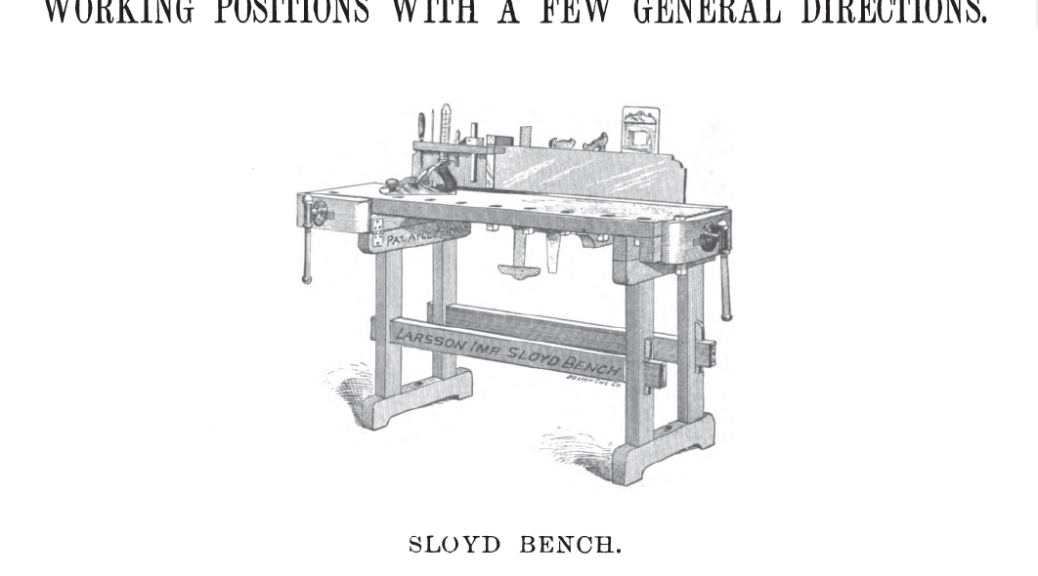Hello My Fellow Sloyders,
Recently we’ve talked a bit about the Sloyd Tool Cabinet and it’s contents — but with all these tools on hand and a book full of models to build, where do you actually build them?
I’d like to introduce you to a slightly more famous cousin to the Sloyd Tool Cabinet — the ‘Larsson Improved Adjustable Workbench’ or more commonly known as a ‘Sloyd Bench’.

This workbench was designed by Gustaf Larsson the principal of the Boston Sloyd School in the late 19th and early 20th centuries and manufactured by Chandler and Barber to Larsson’s specifications. The bench was the result of Larsson’s experiences at Naas, at the Boston Sloyd School and at the North Bennet Street Industrial School. It draws upon design elements found in traditional continental European benches but was scaled to the needs of a classroom setting and had to accommodate both children and adults.

How do we know so much about this bench?
In some ways it is fairly well documented in old tool catalogs, like those of Chandler and Barber — the premier supplier of ‘Sloyd System’ benches, tools and supplies and in other advertising. In addition, a fair number of these benches still survive which is a testament to how well they were built and how many of them were produced. While the North Bennet Street Industrial School catered to training immigrants and younger students in its earliest days, the Boston Sloyd School focused on teaching the teachers of Sloyd. Teachers would come to the school, learn how to teach Sloyd to students and then go back to their municipalities to teach Sloyd to the local population. So with diplomas in hand these new teachers often wanted to order the same or very similar setups to what they learned on. This was the genesis of many manual training programs in the United States.

Above you can see one of the many ads Chandler and Barber took out in Sloyd related publications — in this case the ‘Sloyd Record’ which was the alumni newsletter of the Boston Sloyd School. Chandler and Barber seemed to be the most prolific dealer in this space, but just like today there was a lot of competition. You’ll see ads from Hammacher Schlemmer (they used to specialize mostly in tools and hardware back then), lumber dealers, publishers and other similar companies trying to get a piece of the apparently semi-lucrative Sloyd pie.

The competition got so fierce that some of the Chandler and Barber felt it was worth mentioning how others got burned trying to save a few dollars going with a competitor’s bench of inferior quality. Don’t be a part of that sorry lot…..

What made this bench so special?
Beyond being the brand name bench associated with Sloyd pioneer Gustaf Larsson the bench did have some novel features. If you look carefully in the picture above you can see a set of hinges on the cross member of the base (near where you see the word Pat.Aplc..). Why would anyone want hinges on their bench? Essentially you could take the top of the bench off, flip up or down those blocks, re-install the bench top and be able to accommodate both children and adults in the same workspace. Over the years several models of bench were associated with Larsson’s name, including the popular No. 5 model shown here, another larger model designed for 2 students to share a workspace, and even a clamp on vise which could be used for light work when attached to a sturdy table.
Beyond being a reasonably stout bench, it could be ordered with wood or metal vise screws, a few variants of removable tool rack (which made it easy for instructors to see if all the tools were put back in their proper place and in good condition), vise and dog hole configurations and similar tweaks.

During my time at NBSS over the years I’ve had the chance to work at some of these benches a few of which seemed to survive in the darker corners of the workshop department. At the time I didn’t realize the history of what I working on — I thought it was just another old workbench which had seen better days and was propped up to accommodate taller students. At this sort of old bench I first learned to layout and cut a proper dovetail and it was well suited for the task and you could fit a fair number of them in a modest sized classroom. The benches were commonly bolted down into the floor which made up for the lack of mass when compared to a full sized bench. As a joiner these days I am used to working from a much larger bench as I work on a bigger scale, but if you are tight on space or find a good deal on a used model, it would be a great place to start on your path to more enjoyable woodworking.
In your travels, if you see any of these benches, tool cabinets or Chandler and Barber catalogs from the early 1900s, I’d be interested to see or hear about your findings here on the blog or via email.
Take care,
-Bill








